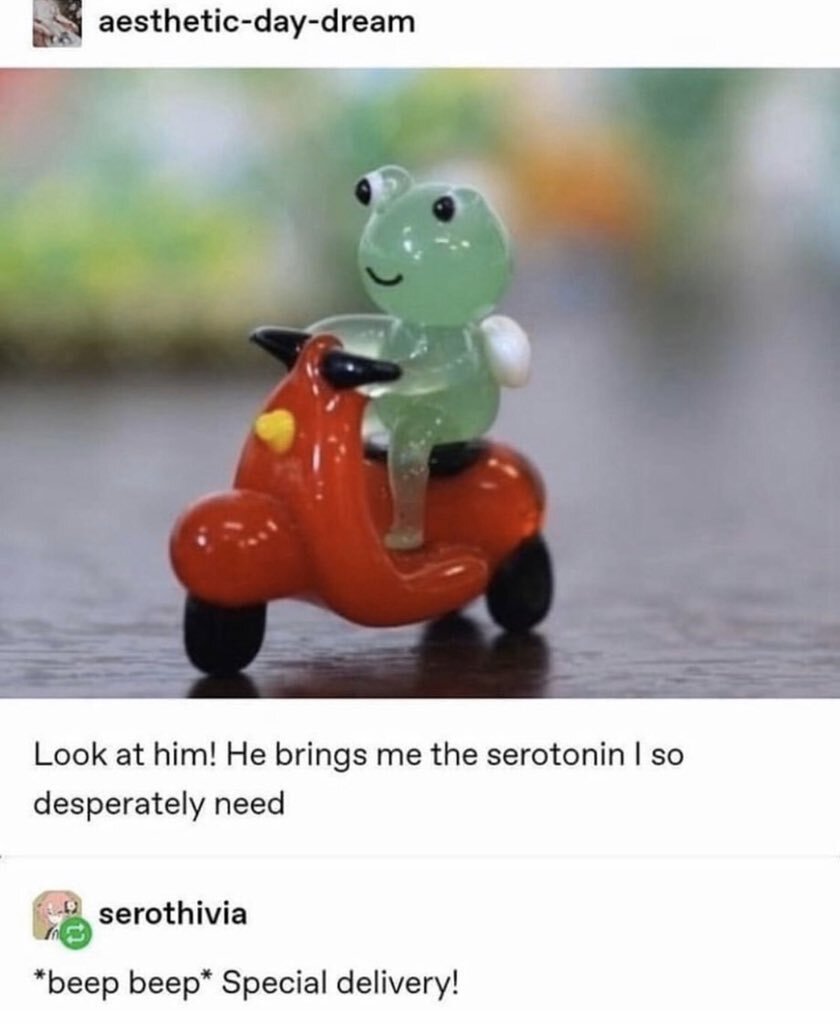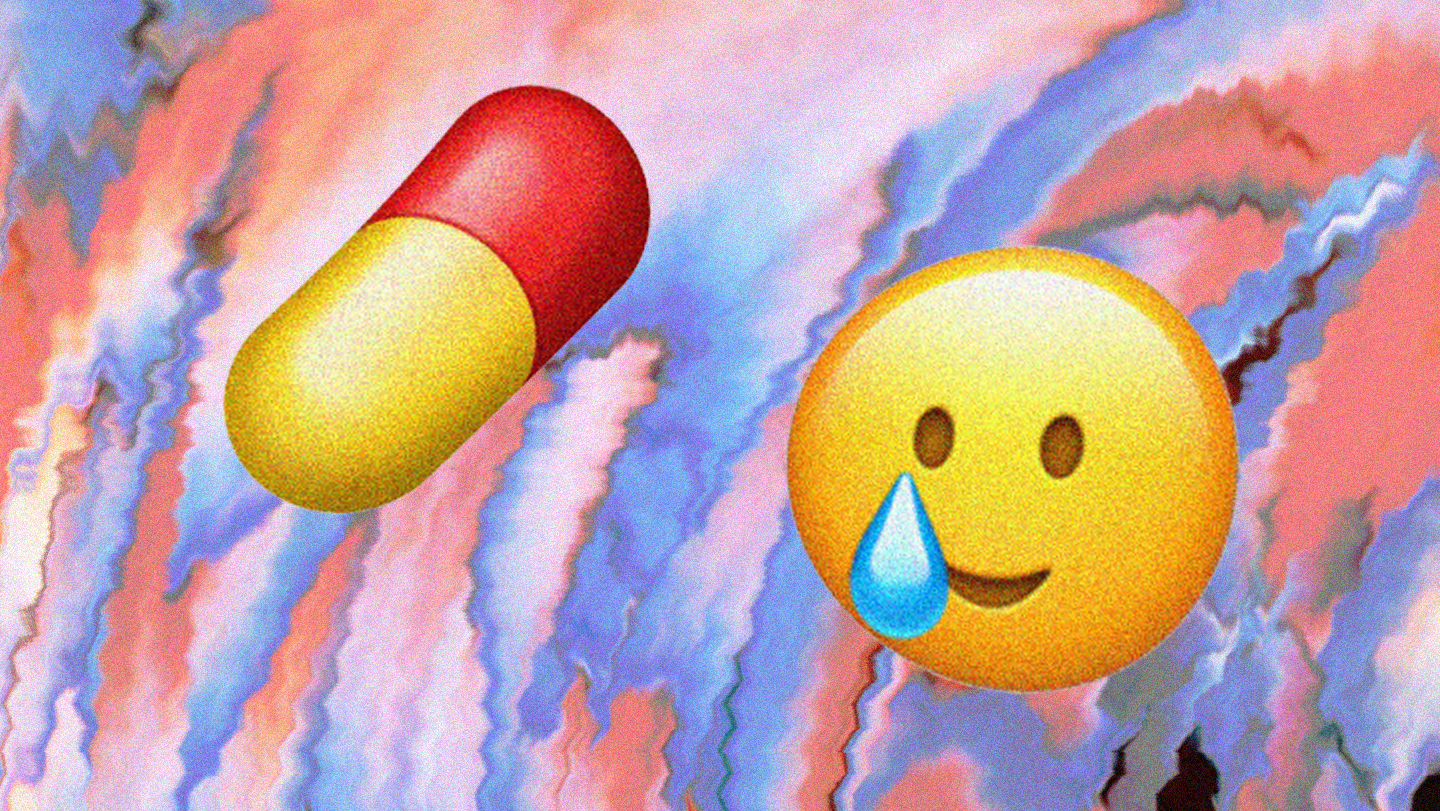Serotonin is cruelly elusive to many of us; but if you’re looking for some, turns out the entire internet is flooded with the stuff. From Insta memes to Twitter gags to TikTok explainers to rave forums, there’s a lot of 5-HTP in HTTP.
The reason? Unlike the majority of the other 60 or so signalling molecules known as neurotransmitters, serotonin is vaguely understood by a huge proportion of the population (like, who’s heard of Neuropeptide Y?). While it might be the kind of reductionist description that makes an actual scientist wince, you’ll likely know that serotonin is the ‘happy chemical’. It’s a big mood; it stabilises your emotions, influences the way you feel and can be replenished by antidepressants — of which I’ve taken over a thousand — dietary changes and talking therapies. And, as we all know, a low amount of it leads to depression. Right?
Well, maybe not. In this month’s head fuck moment, a UCL study by Dr. Joanna Moncrieff and Dr. Mark Horowitz went viral for suggesting that depression is not caused by low amounts of serotonin. “We conducted a systematic umbrella review of this research,” Moncrieff tells me. “The theory that depression was caused by abnormally low serotonin was proposed in the 60s and massively promoted in the 90s in pharmaceutical marketing,” she explains. It was based on measuring serotonin in the blood — given that directly analysing levels in the brain was and is still not possible — and is why, according to the study, around 85% to 90% of the public believe that depression is caused by low serotonin or a ‘chemical imbalance’.
Here’s where it gets weird: as sensationalist as the tabloids’ transmissions of the article may have been — it’s already in the top 5% most-shared research ever published — the news wasn’t that sensational; scientists have long known that low serotonin doesn’t equal depression. For many experts who read the review, it was merely reporting what had already been reported, scaled up in an unbalanced way. And, my God — academics do not hold back. “Joanna Moncrieff, who has made a career attacking windmills,” Victor Reus, a professor of psychiatry at the University of California, starts in style, “…who seems to have little understanding or belief in neuroscience, has gotten a tremendous amount of press out of a non-story.” Neuroscientist Gitte Moos Knudsen, meanwhile, tells me that Moncrieff is “flogging a dead horse”. Considering, though, most of us still think the chemical imbalance thing is legit, Horowitz has a point when he says that “it reflects how poorly the experts have communicated it to the public.”
See, just as us mere mortals have just managed to grapple with what the hell serotonin is, scientists have steered away from what Reus calls the “straw man argument” of the chemical balance theory, one that “never had much credibility in the scientific community”. He points to the fact that Tianeptine, an effective antidepressant from the 80s, actually reduced levels of serotonin rather than increased it. Mice, ever the actual guinea pigs of science, have long had their serotonin artificially lowered without causing depression, and some people with low serotonin in their blood aren’t depressed at all, while others with high serotonin are.
So if it’s not low serotonin, what is it? Given the all-encompassing nature of depression, many variables and theories are being investigated. For Moncrieff herself, it’s purely situational: “There are indeed many theories of other biological mechanisms that might produce depression, but none have been proven or demonstrated consistently,” she says. Here is where it turns contentious: “We do not need to think of depression as a brain disease. We can think of it as an emotional reaction to adverse life events and circumstances,” she continues.
Many still disagree with this one-size-fits all approach of attributing depression to life events, in the same way that the whole chemical balance idea by itself isn’t useful. “Today, most scientists within the field find that depression is a heterogeneous disorder, with different underlying causes, much like fever,” Knudsen tells me. A vast number of alternative theories exist including inflammation and a lack of neurogenesis, and different depressions may be caused by different things. But Horowitz and Moncrieff are adamant that it’s all about the dodgy rollercoaster of life.
Both see this as a positive thing, something that frees you from concern about having a broken brain. Horowitz, who has been tapering off antidepressants after 20 years of use, notes that this perspective changed him from thinking he was a “fragile person with depression” to looking into past trauma, arguing that the “chemical imbalance story makes people more pessimistic about recovery” and “less likely to choose therapy”.
But could the opposite not also hold true? Isn’t there some sort of comfort taken in depression being a tangible, treatable disorder? I certainly feel ill rather than unhappy about life. It also seems scary that this view could regress to the idea that depression is a form of sadness — something which Horowitz doesn’t actually totally dispute: “There are no brain findings that differentiate clinical depression from sadness… the things that cause sadness also cause depression.”
Whichever the case; if low serotonin doesn’t necessarily mean we get depressed, what’s the implication for the seven million people in the UK, like me, on SSRIs? There’s a strong case to be made that even if we don’t know how antidepressants work, they’re working; aside from the fact that people are continuing to take them, a major 2018 study reviewing five hundred trials seemed to prove they were effective (though it’s worth noting that the top three weren’t SSRIs). “The analogy I use is around taking paracetamol — they work for headaches for some people, but headaches aren’t caused by low paracetamol levels,” Michael Bloomfield, a Principal Clinical Fellow at UCL, tells me.
Moncrieff and Horowitz are entirely anti-SSRI. Horowitz says that taking a brain-changing pill every day is different to popping a Panadol — the side effects far outweigh any benefits. He cites studies like this, that show just a 1.8 positive difference on the 0-53 depression scale, compared to 6 points gained by better sleep. It’s convincing: but it’s hard to get my imbalanced head around the idea that we’ve been sold a complete lie, ignore my own experience or dismiss the positive stories of so many friends. If they work, then, well, they work? What the study does at least, wherever you sit on the fence between pill and no pill, is make people reconsider their options. Whatever you do though, don’t stop taking antidepressants without consulting your GP, and never, ever go cold turkey.
But hold up, there’s a twist in the tale — serotonin isn’t over yet, baby! Our beloved neurotransmitter returns from the ashes of our anxiety cigarettes. While Moncrieff and Horowitz see its involvement in depression as purely tangential, many of those who responded to the paper think it still plays a part. “It’s almost certain to play some role in the expression of depressive symptoms,” says Phil Cowen, a psychiatrist at the University of Oxford, while Michael Bloomfield notes that “there’s loads of evidence that the serotonin system plays key roles in how we process emotions”.

We’ll leave further studies on how serotonin processes emotions to the scientists — but how do internet representations of it do the same? In the last few years, serotonin memes have been on the rise, poking fun at us all being on the ‘last crumbs of serotonin’ via memes of Oliver Twist asking for more, or a tiny toy frog on a scooter delivering some to your door. “I believe Tumblr was where I first encountered people joking about serotonin,” says Miles Klee, who’s written on serotonin memes before. “It’s always been a platform where folks are open about mental health in an irreverent way. Blaming your depression on this one particular (absent) molecule is a great example.”
If the relationship between serotonin and depression is in tatters, is it bad to be joking about it and spreading misinformation? For Victor Reus, these kinds of memes are, from an informed neuroscience perspective, “stupid beliefs”, fuelled by misrepresentation in advertising and journalism. Similarly, Moncrieff and Horowitz see it as helping to advertise for Big Pharma. In the same way that we pathologise normal behaviour on social media and spread over-diagnosis, joking about depression might not be too mindful.
Equally, though, we’re all so fucking miserable, and it’s nice to have some sort of mechanism — even if flawed — to connect with others. Oliver Twist holding a bowl of serotonin might show we don’t know a thing about neuroscience, but in a way, ‘serotonin’ has become shorthand for discussing mental health in general. While Michael Bloomfield admits that “oversimplification” is dangerous, he understands that we’re all “trying to make sense of a complex world and sometimes simple messages are appealing”.
Miles Klee is equally sympathetic. “People want to own their experiences with mental health issues while destigmatising them,” he says. “Bonding over the absurdity of having your thoughts and feelings dictated by neurotransmitters sloshing around in your head is a perfect opportunity for both.” Even if it’s a “reductive understanding”, he says, it leads to people looking into the science more.
Essentially, it’s all a minefield for the mind, and while low serotonin may not the cause of depression and medication might not be the answer, it probably plays some small, even consequential, part. And for as long as it does we’ll hold its mythological powers close.
Follow i-D on Instagram and TikTok for more on mental health.


